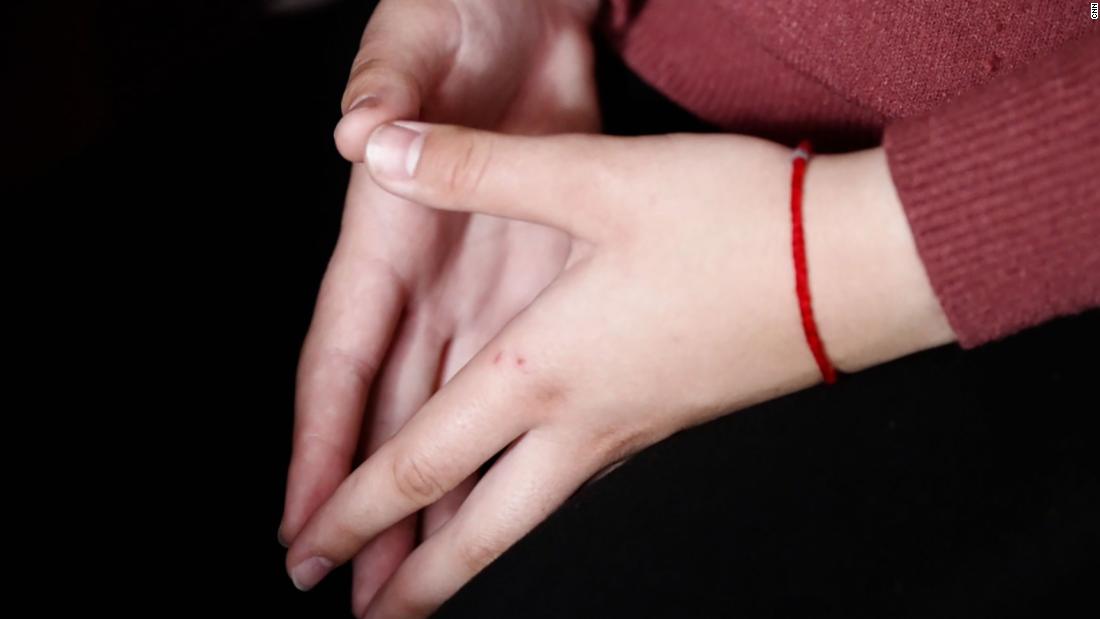Kherson: In Russian-occupied region, allegations of rape emerge
It was mid-March and 16-year-old Dasha was about six months pregnant.
One of the soldiers, who Dasha said was drunk, began asking how many rooms were in the house, and the ages of the children.
What followed is an incident that Ukrainian prosecutors say is a war crime.
While the unrestrained violence around Kyiv has embodied the pointless savagery of Russia’s onslaught against civilians, dark and untold stories of their brutality in tiny, distant villages, like Dasha’s, in Ukraine’s southern Kherson region, are slowly emerging.
Those stories are helping to paint a pattern of a Russian military, pockmarked by criminal behavior and, in this case, the alleged assault of a minor at her most vulnerable.
Dasha said that when the children, a 12 and 14-year-old girl, saw the soldiers in their kitchen, they were frightened.
“First, he (the drunk soldier) called my mother into another room. He let her go quickly. Then he called for me,” she said.
“When I came in, he first told me how he saved two people in our village — a mother with two children,” she said.
But then the soldier, who Dasha later learned was from Donetsk and called “Blue” by other soldiers, became violent.
“He started to shout, first telling me to undress. I told him that I will not, and (he) started shouting at me. And he said that if do not undress he will kill me,” she told CNN.
At that point, the other soldier entered the room and warned Blue that he would have trouble with the rest of the unit if he pursued his apparent plan.
Blue seemed unbothered by the warning, Dasha said, and his colleague left, telling him only to return to the unit in 30 minutes.
“When I resisted, he strangled me and said he’ll kill me. Then he issued an unimaginable threat, she said, telling her, “Either you sleep with me now, or I will bring 20 more people.”
Dasha’s story was interrupted by her sobbing. Her mother sat near her as she spoke, also visibly distressed.
“I just remember that he had blue eyes, and it was dark there, and I did not remember anything,” she said.
Dasha said that after she was raped, her perpetrator tried to attack her several times again until two Russian snipers intervened to help, taking her and her family to another house.
CNN does not identify victims of sexual assault and in this case is referring to Dasha by a pseudonym.
There, they told her they had killed Blue, she said. Dasha later learned that was a lie, when she was summoned by a Russian paratrooper commander in the next village to discuss her attack.
But it wasn’t a conversation, she said. Instead, it was a terrifying interrogation.
“He (the commander) used some kind of psychological tactic,” Dasha said.
“He started saying the same things as the rapist had said to me, screaming at me and (saying that) he would do the same as the rapist did. I was so frightened, and I started crying.”
After she became upset, Dasha said the commander then decided she was telling the truth. It is unclear what happened to Blue.
Dasha had heard other Russian soliders say that her perpetrator had a “criminal past.” She believes he was looking for a target.
“We were told that he was going around the village,” Dasha said, “and looking for someone he could… ‘a girl of easy virtue’, as they said.”
CNN has reached out to the Russian Ministry of Defense for comment.
About a week after the alleged attack, the Russians left her village.
A report by the Organization for Security and Cooperation in Europe (OSCE), released on April 13, found violations of international humanitarian law by Russian forces in Ukraine, noting that “reports indicate instances of conflict-related gender-based violence, such as rape, sexual violence or sexual harassment.”
CNN cannot independently verify Dasha’s harrowing account, but Ukrainian prosecutors in the Kherson region said in a statement they had investigated her account.
In a statement, the prosecutors said, “Thanks to the testimony of the victim and the results of a number of investigative actions, it was established in early March 2022, during the occupation of a village where there was no military facility of Ukrainian servicemen, (there were) war crimes against civilians, including the rape of a minor resident of the village.”
The prosecutors declined to provide further details, citing privacy concerns.
As some parts of the country seek to rebuild, the trauma of the Russian occupation continues to terrorize communities in the south. Its brutality is visible on roads, buildings, and homes. But for survivors like Dasha, the trauma of that occupation will long live beneath the surface.
![]()


